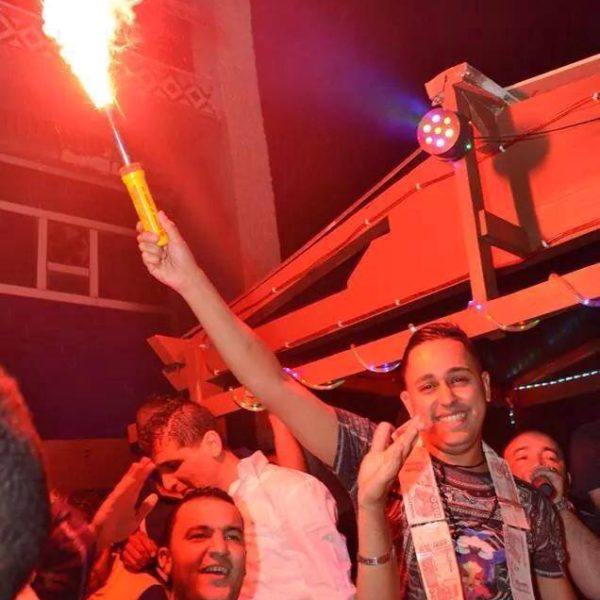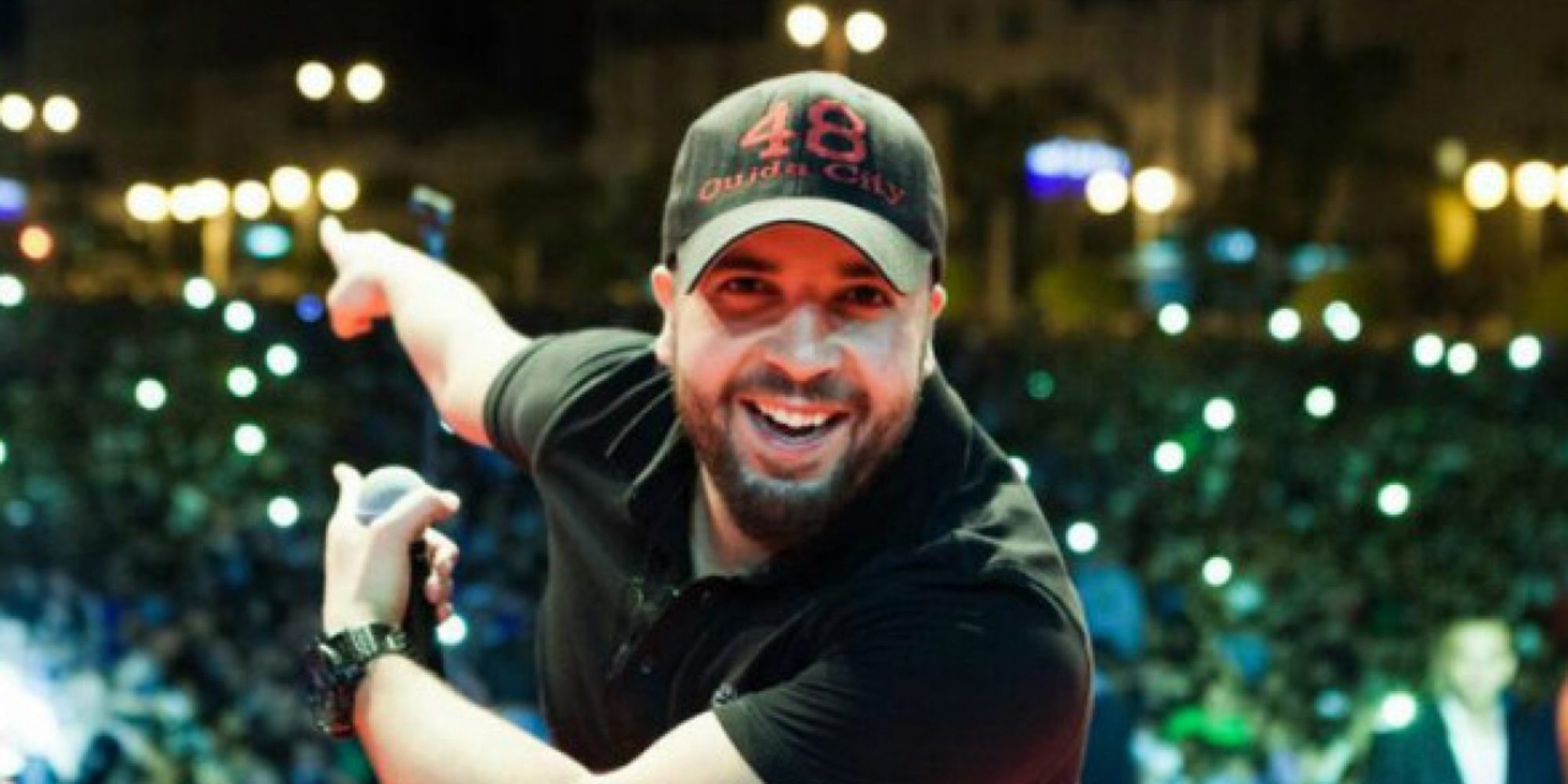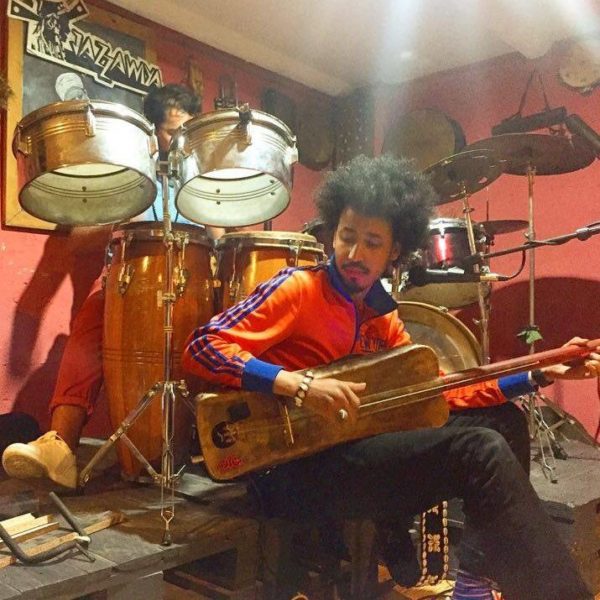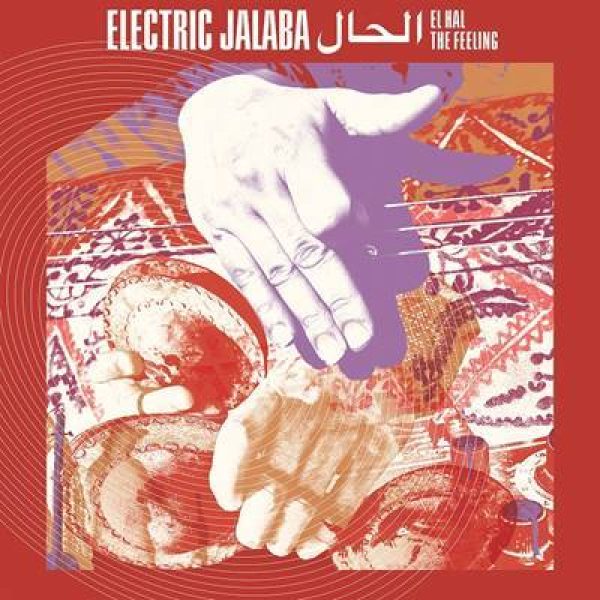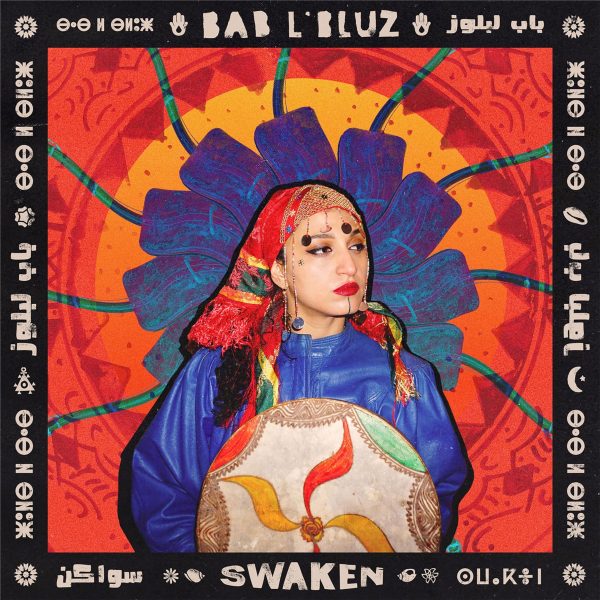Abdelhafid Douzi, more commonly known as Douzi, is one of the biggest North African artists of the past two decades. With over 900,000,000 YouTube views, his songs are staples in Moroccan households. His oldest music video is a cover of the famous Moroccan band Jil Jilala’s ‘70s hit Laayoun Aynia (translation: My Beloved Laayoune), a song about the Moroccan Sahara. With over 30 years in the music industry, Douzi has won numerous awards for his music. Recently scheduled to perform at the 2025 Harvard University Arab Conference but denied entry at the American border, Douzi took the time to discuss this and more in an interview with Afropop’s Salma El Boudali.
This interview has been edited for length and clarity.
Salma: Hello! How’s it going?
Douzi: It’s going well, how about you?
I’m good. Thank you so much for finding the time to do this interview! We really appreciate it. So I’ll begin with the first question.
Sure.
What made you enter the music space to begin with?
Since I was young, my brother has been in the music world. He has a lot of experience in it. He was a singer, composer and lyricist. When he found out I had a God-given good voice—from a young age, I was good at singing—he decided to pause his career to follow and help me. He taught me how to sing and taught me the fundamentals of the music field. We worked a lot together—years. With time, we began to release our music. So from the beginning, I worked with my brother. He’s always the writer, the melodist, and he’s in charge of everything. Afterwards, over time, we began to expand our reach.
I lived in Morocco when I was younger, I began my music career in Morocco, and then I moved to Belgium to be with my family. Here, I met a lot of melodists and lyricists. We developed my music, and every time the music field changed, we changed and developed with it. And of course, when you’re in the same field for a long time— thirty years—and you start being successful, you necessarily have to evolve.
Speaking of music, I want to talk with you about a big song you have, “Laayoun Aynia.” This was the first song of yours I’d heard. It’s about Morocco and the Sahara, and it exploded in the Arab world when it came out. What inspired you to write this song and share it—especially since it’s very patriotic and is about your Moroccan identity?
“Laayoun Aynia” is an old song. It was sung by the group Jil Jilala. They were an old Moroccan band, and they sang this in 1975. This song is beloved to all Moroccans. Older generations know it, but newer generations wouldn’t. My brother had the idea to take this song and give it a new, modern style, and allow newer generations to access it. This was the idea that we started with. We took the song and redid it in a new way—a younger way—so that even non-Moroccans could still enjoy it, because the music is very old. It has a Moroccan rhythm, and anybody with a Western-ear would find it heavy. They might not understand it. So we needed to make it more digestible, even if it was in Arabic or Moroccan. This is how the idea began. Honestly, we weren’t expecting the song would be this successful. But I was very happy, because folks from the Sahara always request this song, and I’ve done big events with it, including an NBA halftime show. And I’ve sung at a lot of festivals where this song had a big impact. This is one of the songs that’s incredibly important in my career.
I’m familiar with some of the famous, old Moroccan bands, like Jil Jilala, Nass Al-Ghiwane, and Lemchaheb. But I didn’t know this song was Jil Jilala’s and not yours!
No, it’s not mine. Our goal was for younger generations to know the song. It’s a song about Morocco, about the Moroccan Sahara, and it’s a song with a really nice message. It’s about peace, love, and is not about violence or war. To the contrary—we got our land back, but did so in a peaceful way. So the song is patriotic.
Wow, I learned something new today.
Well then, we’ve accomplished our goal with this interview! Now this song came out in 1975, so it’s been 40 years, and even now in the Sahara, little kids as young as seven and eight sing it with me! It’s exciting—that a song from 1975 is still being sung by a ten-year-old.
Yeah, that’s fascinating. And who knows—maybe someone else will come along and redo the song and lengthen its life even more. Maybe you will.
Maybe. And that’s the nice thing—when there are good songs in a repertoire, in this case, Moroccan heritage, it’s important to reawaken something older and make it newer every once in a while. Allow younger people to know it. I have songs of mine that were released 25 years ago, and this generation may not know them. So once in a while, I try to bring them back and make them newer, give them fresher music, so that younger generations know them.
Many non-Moroccans don't know about these big groups, like Nass Al-Ghiwane, Jil Jilala, and Lemchaheb. You said you got “Laayoun Aynia” from Jil Jilala, so can you talk a little about how these big artists inspired or helped you in your musical career?
So normally, before you cover a song, you need permission from whoever sang it. So when we wanted to cover this one, we called the band, and they liked the idea. So they sang with me and were featured in the song. My song isn’t Douzi on his own—the voices with me are Jil Jilala. The one who sang with me in English is David Piccolo, who’s originally Italian and Belgian. As for the band Jil Jilala, they stayed with me for one week and we worked in the studio together. The song was then released, and it exploded. To this day, there isn’t an event related to the country of Morocco that doesn’t play “Laayoun Aynia” or “Ana Maghrabi.” These two songs are always there.
This past Ramadan, you released a few nasheeds. How does religion or spirituality play a role in your music?
Religion is a part of us that we can’t live without. Whether you’re Muslim, Christian, Jewish—religion is what we go to when we don’t feel good. It’s what helps us make decisions. I see religion in a good light, and I think people should be an example of their faith. You want to set a good example of your character, your respectability, and your religion. In my music, I sing about many things: love, my country, foreignness—for those who live far from their home country. At the same time, it’s normal that I sing songs about religion and big events, like Ramadan and Eid.
Ramadan is an important time for us as Muslims, and sometimes there are people who don’t like to listen to music. So you give them an opportunity to do so when it’s about religion. I used to receive letters from people who say, “We don’t listen to music, we would love it if you released religious songs.” You shouldn’t forget these people, and you should please them, because they also like you as an artist. So you shouldn’t sing for just one group of people—when you’re an artist, you’re for all people who listen to you. An artist sings for the public, not for himself. So sometimes when Ramadan comes around, I write something about it.
So I’m going to switch topics a little. Now you’ve spoken about this publicly—how several months ago, the U.S. denied you entry. What did this experience, perhaps, reveal to you about your identity, especially as a Muslim-Moroccan man?
This wasn’t a problem regarding identity. It wasn’t because I’m Moroccan or Muslim. It’s because America has a law it upholds regarding certain countries, countries with war or political problems, where they’re on a blacklist. I didn’t know this before, and I’ve been to America many times without a problem. I’ve performed there; I’ve filmed a music video in New York. But I went to Iraq to receive an award I’d won, and Iraq was on the blacklist, and I didn’t know that. When you visit such a country, you’re supposed to visit the American embassy and speak with them. They interview you. Then after that, you can enter the U.S.. I didn’t know that, so I went to the airport, headed to Boston. When I arrived there, they said you can’t enter.
Afterwards, I spoke to the American embassy here and they told me I needed to book an appointment, and they’d interview me and give me a visa. I’ve been very busy and haven’t done that yet, but when I’m free, I’ll go and solve this problem. It’s not something very hard. I received a lot of calls from lawyers in America saying they wanted to help me, but I said that’s not necessary. Thank God, it’s not a difficult problem.
I’m actually from the Boston area, and you were intending to attend the Harvard Arab Conference, right?
Yes. It’s okay, it wasn’t meant to be. Honestly, we abide by the laws of whatever country we go to. If the law says to do something, we go along with it. I don’t have a bad track record, I’ve never said anything problematic—to the contrary, I’m an artist. We always sing about peace, happiness, love—we don’t have anything political in our music.
Again I’m going to jump to another subject—
You just keep jumping! Jumping from thing to thing!
I know! When you start talking I get more questions. But this question is very open-ended. You’ve been doing music for a long time—what is it, fifteen years? Twenty years?
Thirty.
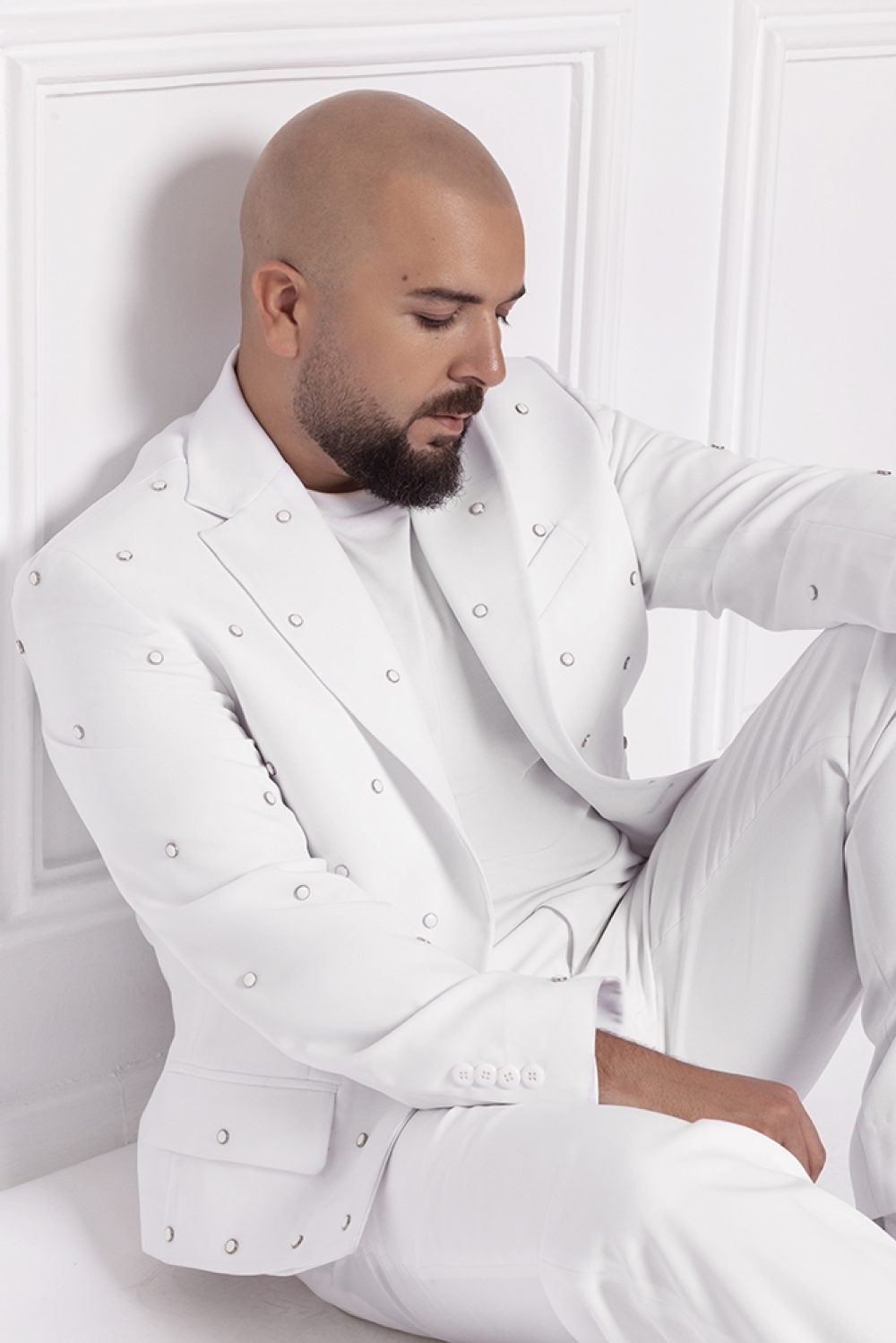
Oh! Wow. Thirty years in the music business, and you have dozens of songs, a very extensive discography. Over time, has your identity as an artist changed?
Naturally, when a person grows they change, even if they’re not an artist. But when you’re in this field, you learn a lot of things, because you have a lot of responsibilities from a young age. You need to be very careful when you’re a well-known artist. You need to know what to say, where to go. Your mistake is considered larger than a regular person’s, because your words are heard and people follow you. So whenever you make a decision, you need to know what you’re doing. This music I make and the people I work with, with time, it evolves. I’ve benefited a lot from what I’ve done. I’ve become a psychologist—you start to understand what people are thinking before they speak. I’ve met a lot of people who’ve helped me in this field. I’ve met people who I’ve benefited from a lot. And of course, you meet people who are negative, too. But this field has good things and not-so-good things, just like anything else. Your personality gets stronger as you take a little beating. As you take beating after beating, you harden.
Right—you become stronger. But can you talk a little about these “beatings” you get? Is it just typical people who say they dislike your music…?
There are people who criticize you. It’s normal. Not everyone will like you or your music or your voice. We know that. It’s not possible to please everybody. It’s impossible. Not everybody will like you or want to listen to you. It’s normal for there to be a population of people who don’t like you. Journalists sometimes lie about you, so you have to always look out and be careful, because I have a family, I have my parents, and I need to make sure that I don’t do something that will harm me or my image or my family. This is normal, and we get used to it. It becomes normal for us, because when you have a team that works with you—who are professionals—they look out for these things with you, in regards to what to say, what not to say, where to go, where not to go, take this down, you shouldn’t do this, this might hurt you. It’s good for an artist to have a team that works with him on anything, big and small.
Is there anything else you’d like to touch on before we finish?
I’m always appreciative of the people who support me, the people who always stand beside me. The people who love me—unconditional love. This love goes both ways between them and I, and this is what allows us to do this music for so long. As for the people of Boston, I hope I return and am allowed in! Honestly, I miss America. I haven’t been there in a long time, and I hope to come and record a music video, and maybe throw a party.
Thank you so much for this interview! We appreciate it.
Of course. It was my pleasure.
Related Audio Programs
